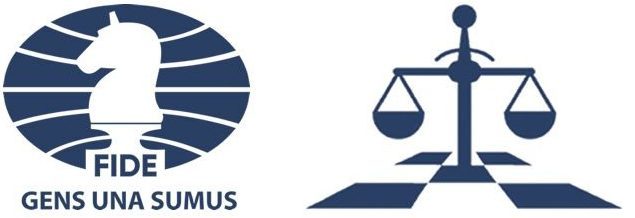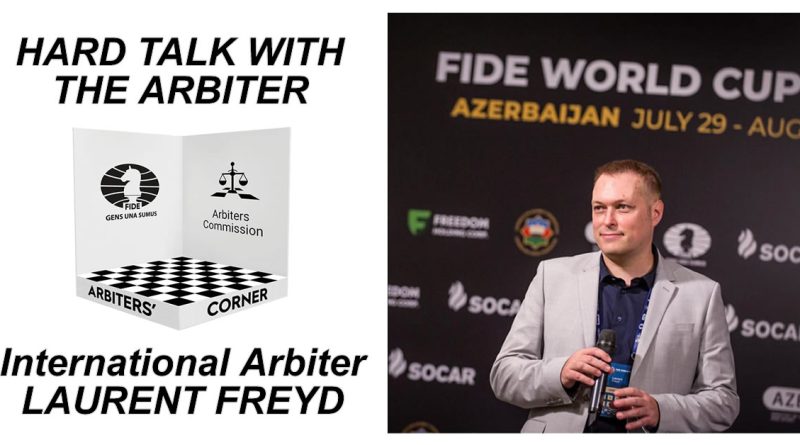HARD TALK WITH THE ARBITER – IA LAURENT FREYD
The FIDE Arbiters’ Commission is proud to present HARD TALK WITH THE ARBITER, a new series of interviews to be found in the Arbiters’ Corner.
In this first issue, ARB Councillor Chanda Nsakanya interviewed Laurent Freyd, International Arbiter and former Chairman of the FIDE Arbiters’ Commission.
1. When did you start playing chess?
I started playing chess 37 years ago, when I was still in Primary School. One day my younger brother came home and he had learnt how to play. He immediately taught me that game I had always been fascinated with.
2. How did you become an International Arbiter?
We could probably say that I did it “the long way” 😉
Administratively speaking, I strictly followed the published regulations for the title application, which is a must for an arbiter, isn’t it? My application was sent to FIDE with my 4 IA norms, to be evaluated during my first Olympiad as an Arbiter, in Dresden 2008 … and it was rejected there.
We had scrupulously prepared the IA application with my federation, including an IA norm which corresponded to my most important assignment by then: Chief Arbiter of the French National Youth Chess Championship 2006, a tournament grouping 1071 players in 14 age group sections + 2 open tournaments; and supervising a team of 12 colleagues (including 5 women – a proportion that I was particularly proud of).
So, what was wrong? Basically, my FA title was awarded in June 2006 and my “strong norm” was achieved in April 2006, posterior to all norms used for my FA title, but anterior to the actual title award date. In 2008, the regulations were about to impose the IA norms to be achieved after the FA title was awarded, however they were not yet published like that. I’ve always said that anticipation is a key skill for an arbiter, however I didn’t mean to face anticipation in that way …
Obviously, I was not the happiest man on Earth when hearing about the decision, but on the other hand, I have always valued quality and experience more than titles alone; and the logic behind the Arbiters’ Commission decision intended to improve the system. So, the Olympiad granted me a norm that I could use as a replacement, and I got the title at the next Presidential Board Meeting: a 6-month delay didn’t ruin my life.
Better read the regulations 50 times in the year than consider that you know everything and lose your vigilance.
Laws of Chess are very important!
What I meant about the “long way” is not only related to that administrative anecdote. When I got my IA title in 2009, I already had 12 years of extensive experience as a chess arbiter. I was very lucky to grow in a federation with hundreds of chess clubs and so many chess events every year, where I could practice a lot on tournaments of reasonable size. As an illustration, in my very first tournament as a 20 year-old arbiter, after I had validated my exams and practice, I was the chief arbiter of a 1 day rapid international event organized by my chess club, with 150-200 players. The day was very exciting, and it happened to be a real success – for sure, I had to continue further! That meant validating all the national steps first, between 1997 and 2005 and then extending my experience on the international scene.
Giving time to mature your experience may sound disturbing to those of us who are impatient to climb all steps at a record-breaking speed, but I’m convinced that time helps us to grow solid foundations and serves us better in the longer term. Trust in the system and those who designed it – in general, they didn’t define requirements to harm you personally, but to secure an overall level of quality, increasing over time as expectations also increase in society in general.
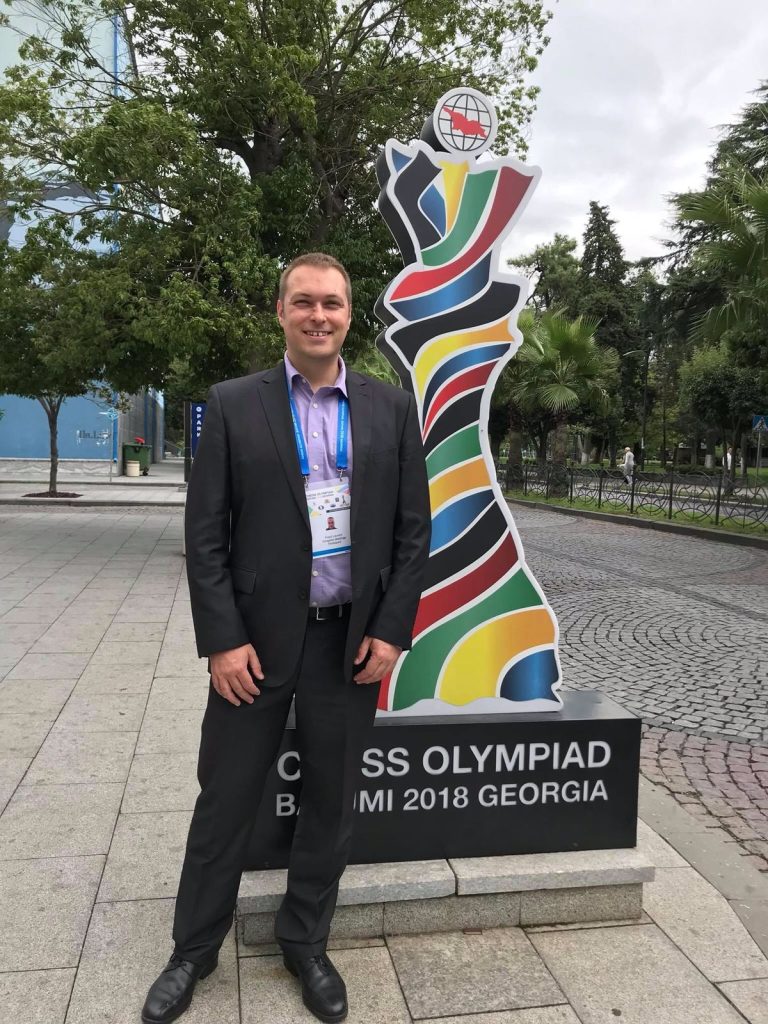
3. What do you need to be a professional (full time) chess arbiter ?
Money! If you don’t need to earn money from your activity as a full-time arbiter, it makes it much easier: then you can satisfy yourself as a professional “holiday arbiter” 😉
Ok, more seriously, any professional activity requires dedication if you want to be successful. That’s a foundational layer.
Staying humble, in front of the mass of information and regulations that arbiters must cope with to do their job properly, is key for me. Better read the regulations 50 times in the year than consider that you know everything and lose your vigilance. This contributes to reducing the risk of mistakes or incidents imputable to the arbiter: both can erode your credibility among the community of chess players. Of course, it isn’t necessary to know every text by heart, however it is good to “feel” which ones you’d better not miss.
Operational excellence: if your ambition is to lead a tournament as the Chief Arbiter, knowing how to apply the laws of chess won’t be enough. You will also need to demonstrate strong organizational skills and be fit with the tools needed for the event (pairing software, chess clocks …). I believe in leading a team by example and sharing techniques, tips etc. with my colleagues: the more they know/understand, the more they are comfortable with the internal processes of the event, the more they will be proactive in the playing area and the better the player experience will be.
Luck and strong references … You know that one shouldn’t count on World or Continental events’ nominations to be a full-time chess arbiter, as there are some rotation principles and limitations in place in FIDE regulations. So, a couple of nominations in the year at each level is already far above the standards. Strong references from private events may help to get introduced to organizers seeking a new chief arbiter, as in general no politics is involved in the recruitment process of private events. I’ll always remember how I was recruited by Manuel Weeks in 2008 for the Gibraltar International Chess Festival. As the Tournament Director, he was seeking a young profile as a floor arbiter, who could reinforce the team and run everywhere in the playing hall in case a board needed intervention. Then, my colleagues and the whole team there adopted me for my professional attitude and supported my promotion to soon become the chief arbiter of the event.
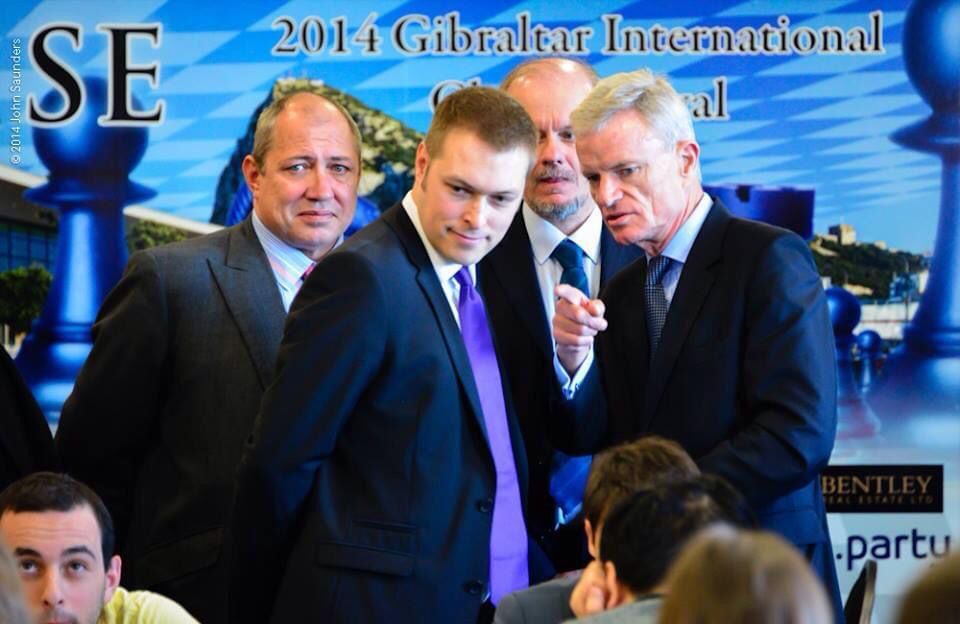
In a nutshell, I would go for quality rather than quantity: hard work, credibility, passion for what you do, integrity, responsibility, helped by a flexible calendar are among the ingredients to make a good full-time arbiter.
4. How did you feel on the day you were announced as PDC Chairperson?
I was very happy and honored to be offered some new challenges in leading PDC. On the other hand, I had the feeling that we needed 2 extra years to finalize the big workplace that we had started under my leadership in the ARB. It’s like you have a mate in 2 on the board but the flag fell … Anyway, that’s part of the game and I’m very happy that we built healthy foundations with the team and that you’re continuing the work under the leadership of Ivan now!
5. What duties do you have as Chairperson of PDC? Tell us about your role as PDC Chairperson since last year, what does your job entail, and the difference with being an ARB Commission Chairperson?
It would be an exaggeration to say that leading this or that commission is exactly the same job, as their scopes and roles obviously differ, but the core of team leadership and pursuing the success of the commission’s initiative are alike. Some commissions like the Qualification Commission have a highly operational orientation through their title validation process. Some others like the Rules Commission mostly deal with administrative/regulatory topics. You have transversal commissions like the Women’s Commission. Also, some commissions like the Trainers Commission or the ARB have a good mix of operational activities through their title management process, but also cover the administration/organization of seminars, evolution of regulations etc. I would say that PDC also has 2 main orientations: one is to financially support projects, which we could call the “hard” support; and the other is to contribute to the capacity building of chess actors among the world, which we could call the “soft” support.
So, comparing PDC and the ARB, I would say that the operational part is more present, as we theoretically may have to deal with more than 200 projects from federations and other supported entities every year; we may not have to design a full framework as we did when we refreshed the ARB regulations a few years ago, but we would rather work in “project mode”, as we could do for the Online/Hybrid courses during the pandemic. Also, I wish that we extend the cross-commission collaboration in 2024, especially for commissions that are involved in chess capacity building (training arbiters, trainers, organizers etc.), which is a part of the sponsored projects we usually have to evaluate.
6. What would you like to be improved regarding Arbiters in general ?
That’s a very tough question! There are so many different profiles of arbiters, between the ones who joined the community to help their chess club and the ones who always dreamt of becoming an international arbiter. Also, do you mean “improved by” the arbiters or “improved for” them?
In terms of behavior, I tend to observe a “dependency” to smartphones these days, common to any kind of profile and in the society in general. So, I would say “show the good example to the players and don’t use the phone in the playing area – go backstage if you really have an emergency. Otherwise just wait for the end of the session as expected by the rules”.
What would I like to see improved for the arbiters? There may be many things, but there’s a symbolic thing that I dream of: introducing a set of simple, official, codified gesture to be used by arbiters worldwide, corresponding to the various situations that may arise, like in other sports; to avoid those embarrassing situations that you may too often watch on chess videos, where the arbiter needs so much time to explain to one player what he is precisely dealing with, then confirm the same to the opponent, while a single official gesture or keyword would cut it short.
7. What would you like to be changed in the ARB Commission that you didn’t change during your tenure as Chairperson of ARB Commission?
One can’t all the time change something 😉 I wouldn’t think about drastic changes, but maybe a few initiatives that could be pushed a bit further.
Regarding the selection of arbiters in world events, I believe in the panel system which was put in place as a very positive step forward for the community and the development of talents worldwide. This is the first time ever that a framework has been set up to deal with all positions in all tournaments of the world calendar in a transparently accessible system. What we are missing to reach its full potential for development is the “full year management” of nominations. If you put on the table, at the start of the year, the full list of events, all available spots, potential candidates collected through a call of interest etc. (you may even add as parameters some development strategies for specific federations/zones in need) and deal with all these parameters as a huge single entity, then you may find great matches and easily multiply the benefits for the community: use more different people, achieve some development goals, avoid breaking the rules on panels or the maximum number of nominations per year etc. If the ARB may devise a development plan and an associated strategy in that domain, that would be another way to contribute to the PDC and FIDE wider objectives too 😉
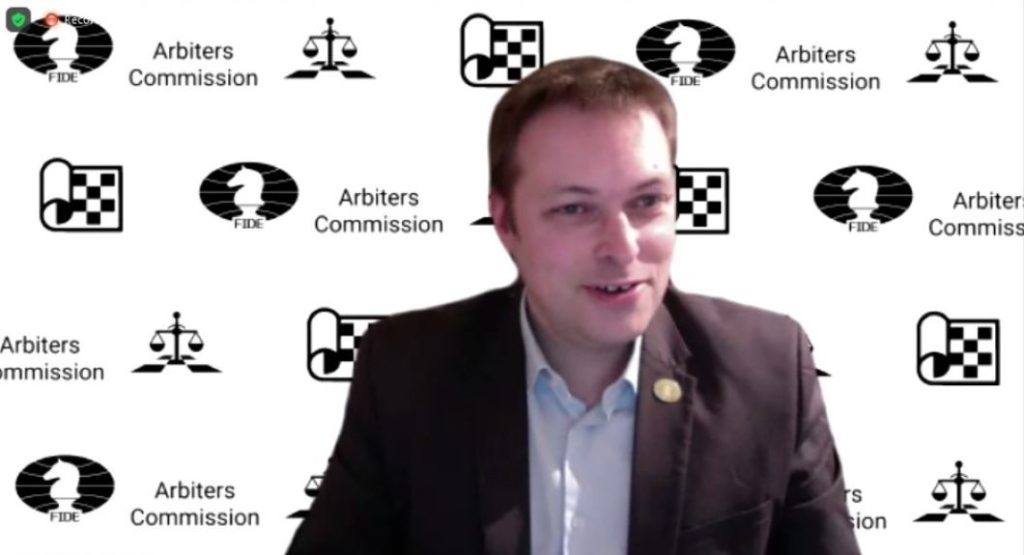
Another topic related to the overall quality improvement would be the evaluation of arbiters and peer training. Officiating in an event can be a transparent experience for an arbiter or a wonderful opportunity to grow and learn, depending on how the Chief Arbiter is prepared to be an actor of personal development for his team or not. One of the tools that can step by step help to have this continuous improvement culture in the arbiters’ community is the tournament evaluation, applied with the highest benevolence of course. It is not about making friends, just evaluating a colleague on strictly professional questions and in a professional manner, so that they may learn and improve. Maybe as a corollary, we may better identify the strengths or preferences of each arbiter in general: some may love to officiate in classical but be “afraid” of rapid and blitz; while some others may only like it when there is a lot of action in blitz.
What we are missing to reach its full potential for development is the “full year management” of nominations [in FIDE Events].
Arbiters’ Panels!
8. When in doubt as a Chief Arbiter, who do you consult?
It depends on the matter. Usually, I work closely with the organizer to ensure we are aligned between the sport aspects and the targets of the event, when we are in a grey area regarding the published regulations etc. If the question is purely technical and the organizer’s view wouldn’t help, I have some experienced friends in the community, including the leadership of the ARB, whom I like to share situations with, and vice versa.
9. What has been your most embarrassing moment since you became an arbiter?
Most probably Gibraltar 2017, last round of the event. The Women World Champion Hou Yifan started her game against Lalith Babu with g4, f3 before resigning on move 5. That was not a funny moment in my career … Long story short, I felt bad, because we had spent one hour together with her in my office a few days earlier (to explain the pairings as she was concerned to be paired against a very high number of women in the event) and obviously that protest action at the end of the event demonstrated that this short session wasn’t enough to make her feel safer. The Arbiters’ magazine dedicated an article to the incident and technically concluded that I had been a good boy and no pairings were deviating from the algorithm😉 Still, I would have preferred to manage convincing the champion, which usually works in case of questions from players. However, 100% success doesn’t exist …
10. What has been your happiest moment as an arbiter?
Chess is my passion and usually the events I’m attending are a great source of joy – otherwise I would probably not have continued my activity as an arbiter for 26 years. Sometimes you witness a historical moment, you deliver a norm to a future world champion or simply you manage to have a full hall of 6-7-year-old kids to become fully silent for the game; or find the winning move that the super GM playing in front of you will execute a couple of minutes later.
Emotions play a role here, so my happiest moment is certainly when my son Viktor joined the team at the Biel Chess Festival and was “adopted” there as a teenage volunteer, enjoying it as a real new experience in life. Sharing this father and son experience is priceless for me.
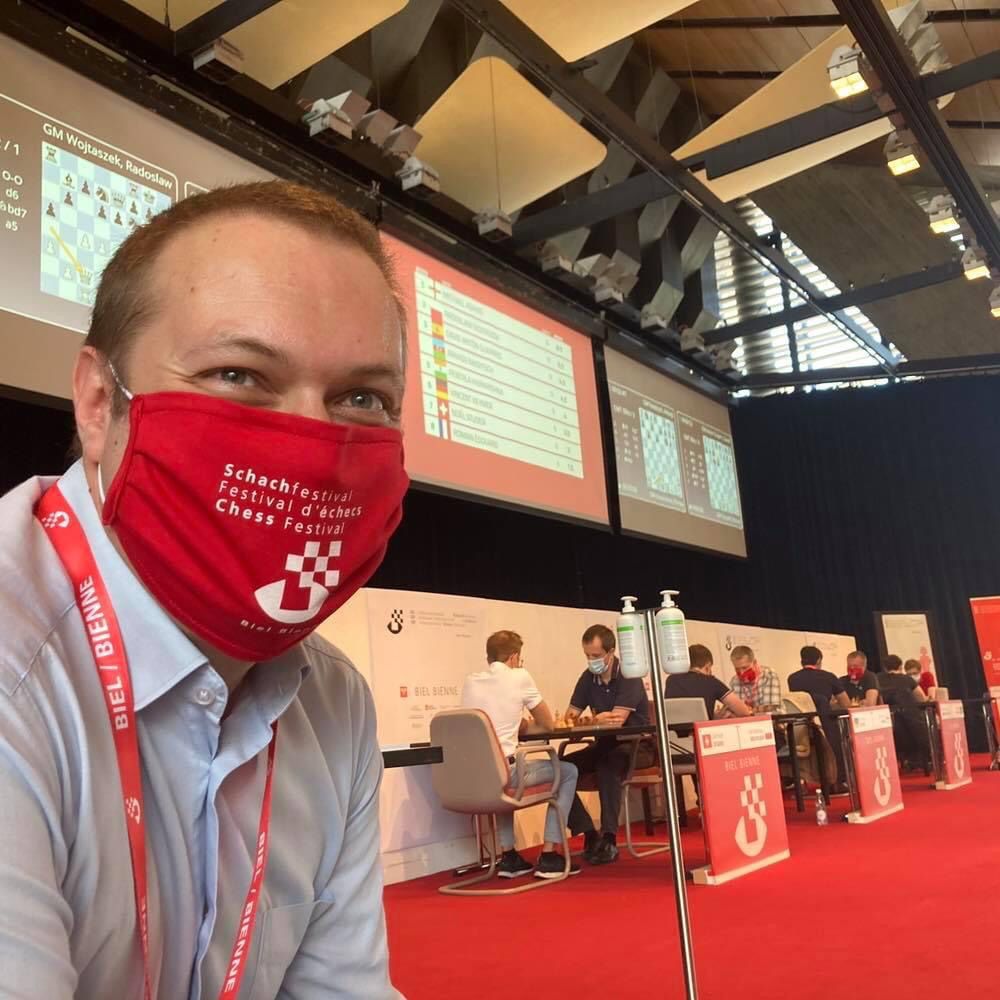
11. In conclusion, what problems as an arbiter (Chief Arbiter) were you facing in last chess event and how did you solve it?
I should probably not speak too much about all the problems that a chief arbiter is facing and fixing before anybody knows about them in a tournament, otherwise the role might look a bit less easy 😉
Before quoting an example or two, I think that most of the issues or problems are related to missing communications or misunderstandings. That is true for any level of tournament. You can write complete regulations, organize a technical meeting, and share the slides; make oral announcements, display information in the playing hall, etc.: you will always have a player at round 6 coming to you and asking about the rate of play.
Recently, at the Qatar Masters Open, I had to face a couple of unusual situations. One of them was a player leaving the game without formally resigning the game. It took quite some time to get the confirmation that he had left the playing hall and we waited for his flag to fall before declaring the game lost. This kind of behavior is described as being “discourteous” in the FIDE Arbiters’ Manual and no automatic sanction is associated to it. So, this is one of the cases where you’d better be aligned with the organizer about the decision you would take. In this case, after a call with the player and a firm warning, it was decided to allow the player to continue the tournament, but an extreme decision could have been to expel him from the competition. About the game itself, after reflection, I feel that it wouldn’t have been a wrong decision to stop the game even before the flag fall; and handle the situation of the player coming back at the board (if it had happened so), on the ground that he disappeared from the playing area for a significant period of time.
Time helps us to grow solid foundations and serves us better in the longer term.
Reach your goal!
Another situation highlighted some challenges with communication in general and the importance of perception for players, as the world number one used social media to share a concern rather than directly escalating to the chief arbiter or organizer … We tried with the organizer to understand what could enhance the experience of the players at the tournament and decided to reinforce the segregation between the different sections of the event, better put under control the media people and published a summary of technical instructions, reemphasizing what had been shared during the technical meeting. I believe it helped well.
Prepared by IA Chanda Nsakanya
